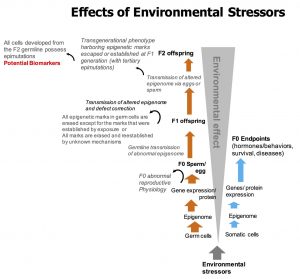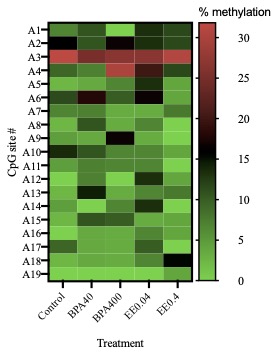Research
Environmentally Induced Epigenetic Memory in Germ Cells

Fig. A current understanding of transgenerational inheritance of acquired traits in vertebrates.
Gene-environment interactions can lead to the emergence of phenotypes. Environmental stressors are able to induce epigenetic changes (chemical modifications on DNA structure) that are mitotically (or meiotically) stable. Environmental stressor-induced chemical modifications, such as DNA methylation or histone modifications, may or may not survive epigenetic reprogramming events that occur during the early cleavage stage of an embryo or during the re-specification of primordial germ cells (PGCs) at the time of sex determination. We hypothesize that the epigenetic modifications that survive reprogramming serve as epigenetic memories and that these memories are associated with adverse health outcomes.
Our research is focused on unraveling epigenetic memories established by estrogenic chemicals that humans and aquatic wildlife are exposed to. We take in vitro cell culture, in vivo animal models, next-generation high throughput miRNA/RNA/methylome sequencing and histone profiling, and bioinformatic approaches to dissect the molecular underpinning of environmentally induced health effects across three generations using medaka and mice as model organisms. We anticipate finding permanent epigenetic memories that alter fine-tuned developmental transcriptional wiring leading to altered health conditions.

Figure: 5mC methylation of mouse estrogen receptor alpha core promoter in the prostate mesenchymal stem cells by different concentrations of BPA and EE2.
Related publications
- Skinner, M.K., Bhandari, R.K., Haque, M.M., Nilsson, E.E. (2015). Environmentally induced epigenetic transgenerational inheritance of altered SRY genomic binding during gonadal sex determination. Environmental Epigenetics 1: 1-10. doi: 10.1093/eep/evv004 [PMID: 27175298].
- Skinner MK, Guerrero-Bosagna C, Haque M, Nilsson E, Bhandari RK, McCarrey JR (2013) Environmentally induced transgenerational epigenetic reprogramming of primordial germ cells and the subsequent germline. PLoS One. 8(7):e66318. [PMID: 23869203]
- Bhandari, R.K., Taylor, J.A., *Sommerfeld-Sager, J., Tillitt, D.E., Ricke, W.A., vom Saal, F.S. (2019). Estrogen receptor 1 expression and methylation of Esr1 promoter in mouse fetal prostate mesenchymal cells induced by gestational exposure to bisphenol A or ethinylestradiol. Environmental Epigenetics, 5(3): dvz012. doi: 10.1093/eep/dvz012 [PMID: PMC6705189].





